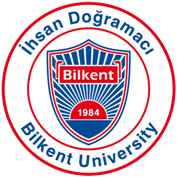Course Description
The course picks up from where CS 201 left by discussing concepts related to algorithmic efficiency on basic abstract data types and some sorting algorithms that utilize recursion. Then, the course introduces the abstract data types of trees, tables, priority queues, and graphs, and shows how one can implement them in C++ using fundamental data structures by emphasizing run-time complexity analysis.
Section 1
| Instructor: | Çiğdem Gündüz-Demir (Office: EA 423, Email: gunduz[at]cs.bilkent.edu.tr) |
|---|---|
| Lectures: | Mon 10:40-12:30 (B 206), Thu 8:40-10:30 (B 206) |
Section 2
| Instructor: | Çiğdem Gündüz-Demir (Office: EA 423, Email: gunduz[at]cs.bilkent.edu.tr) |
|---|---|
| Lectures: | Mon 8:40-10:30 (B Z05), Wed 10:40-12:30 (B Z05) |
Section 3
| Instructor: | Selim Aksoy
(Office: EA 422, Email:  ) )
|
|---|---|
| Lectures: | Tue 8:40-10:30 (EE 412), Thu 10:40-12:30 (EE 412) |
Teaching Assistants
- Yiğit Özen (Office: EA 427, Email: yigit.ozen[at]bilkent.edu.tr)
- Can Taylan Sarı (Office: EA 425, Email: can.sari[at]bilkent.edu.tr)
Office Hours
- Çiğdem Gündüz-Demir: By appointment
- Selim Aksoy: Tue 13:40-14:30, Thu 13:40-14:30
- Yiğit Özen: Mon 12:30-14:30
- Can Taylan Sarı: Wed 13:00-15:00
Texts
- Frank M. Carrano and Timothy Henry, Data Abstraction and Problem Solving with C++: Walls and Mirrors, 7th edition, Pearson, 2017. (textbook, ebook)
- Frank M. Carrano and Timothy Henry, Data Abstraction and Problem Solving with C++: Walls and Mirrors, 6th edition, Pearson, 2013. (old version)
- Mark A. Weiss, Data Structures & Algorithm Analysis in C++, 3rd edition, Addison Wesley, 2006. (recommended)
- Harvey M. Deitel and Paul J. Deitel, C++ How to Program, 8th edition, Prentice Hall, 2011. (recommended)
Lectures
Topics |
Contents |
|---|---|
Algorithm Analysis[ Slides ] |
|
Sorting[ Slides ] |
|
Trees[ Slides ] |
|
Heaps[ Slides ] |
|
Balanced Search Trees |
|
Hashing[ Slides ] |
|
Graphs[ Slides ] |
|
Exams
- The first midterm exam will be held at EB 101, 102, 103, 104, 202, and 203 during 17:45-20:00 on March 27, 2020. It will be a closed-book and closed-notes exam. No A4 sheet will be allowed.
- The second midterm exam will be held at EE 03, 04, 05, and 214 during 17:45-20:00 on April 29, 2020. It will be a closed-book and closed-notes exam. No A4 sheet will be allowed.
- The final exam will be held at TBD during TBD. It will be a closed-book and closed-notes exam. No A4 sheet will be allowed. The exam will cover the whole semester.
- There will be several quizzes throughout the semester. There will be no make-up quiz for the missed quizzes.
Homework
Please make sure that you are aware of the homework grading policy that is explained in the rubric for homeworks.
- Assignment 1 (codes): Due 23:55 on March 9, 2020
- Assignment 2 (tutorial and data): Due 23:55 on March 30, 2020
- Assignment 3: Due 23:55 on April 24, 2020
- Assignment 4: Due 23:55 on May 17, 2020
- Assignment 5: Due 23:55 on June 1, 2020
Homework assignments will be posted on this page about 10 days before their due date. Assignments are expected to be turned in by 23:55 on the due date. You should upload your solutions to the homework assignments using Moodle before the deadline. Please contact the instructors or the TAs for the late submission policy.
Please make sure you fully understand the Bilkent University Policy on Academic Honesty (in Turkish) and the Rules and Regulations of the Higher Education Council (YOK) (in Turkish). Cheating and plagiarism on exams, quizzes, and homework assignments will be punished according to these regulations.
Grading Policy
| Quiz: | 9% |
| Homework: | 16% |
| Midterm exam 1: | 25% |
| Midterm exam 2: | 25% |
| Final exam: | 25% |
In order to be able to take the final exam, a student must
- collect at least 40% of the weighted sum of the quiz, midterm 1, midterm 2, and the first 3 homework grades, AND
- collect at least 30% of the first 3 homework grades, AND
- not miss more than 16 hours of the lectures.
Advice
When you are in doubt, ask. Use office hours. If you cannot visit us during office hours, you can always ask questions or arrange meetings by e-mail. Study regularly for the course and attend classes. Do your assignments on time and pay attention to the instructions for submitting assignments. Always make sure that the code you submitted does compile and run correctly.
Related Links
- Data Abstraction and Problem Solving with C++: Walls and Mirrors (7th ed., Carrano and Henry) home page
- Data Abstraction and Problem Solving with C++: Walls and Mirrors (5th ed., Carrano) code examples
- Mark Allen Weiss home page
- Deitel & Deitel home page
- Tools for data visualization: David Galles, Visualgo
- Tools for memory leaks
- PuTTY: Free Telnet/SSH Client
